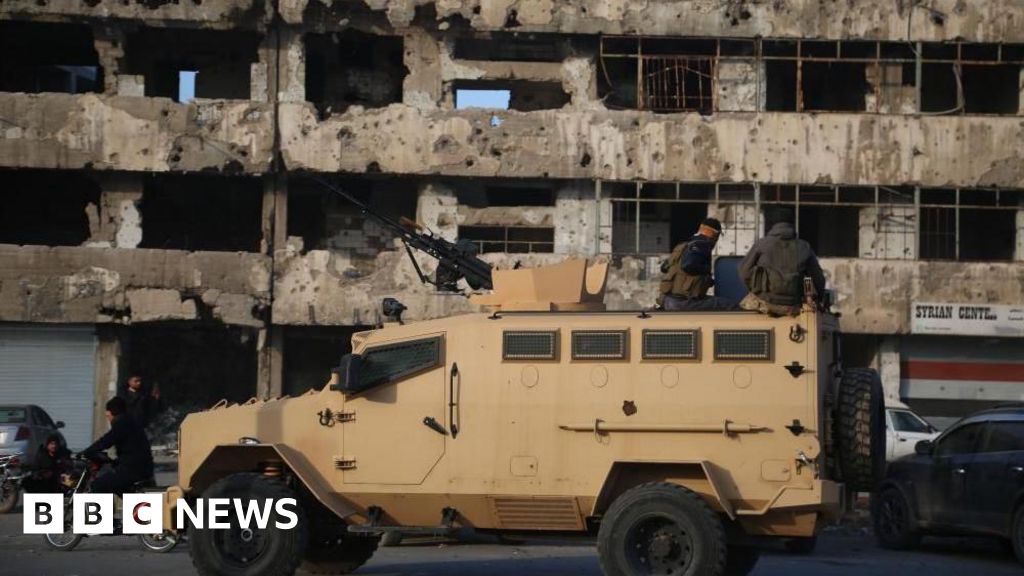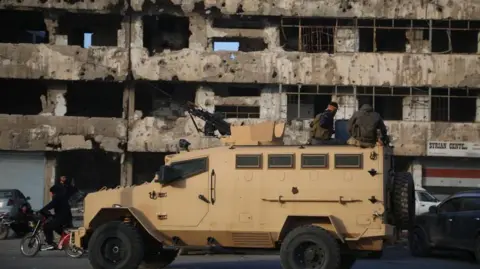US will fear the vacuum that could replace Assad

 EPA
EPAThe speed and magnitude of Bashar al-Assad’s “historic” downfall has stunned the White House. But President Biden is also taking part of the credit.
In his statement, he portrayed the extraordinary shift in Syria’s control as a result of US strategy which has fundamentally weakened the roles of Russia and Iran in the region, helping precipitate Assad’s demise.
In reality, Washington never foresaw that its military support for Israel since the Hamas attacks last October and for Ukraine since Russia’s full-scale invasion in 2022 would contribute to the collapse of half a century of Assad rule in Syria.
But it has, and now the US has to deal with the aftermath – a “historic opportunity” but a moment of “risk and uncertainty”, according to Biden.
Washington is trying to work out what comes next. Who rules Syria? The president met his national security team at the White House on Sunday morning.
The administration will not mourn Assad’s end, Iran’s emasculation or Russia’s humiliation in Syria.
Its fear is about a vacuum in which what it saw as an undesirable but relatively stabilised balance of forces could be filled by something it wants even less: a power grab by Islamist insurgents, including factions designated as terrorists by the US, unresponsive to the breadth of Syria’s wider population, potentially triggering further chaos and new risks for the region.
As Damascus echoes with celebratory gunfire at Assad’s downfall, most Syrians won’t share the American handwringing. The US will briefly join in on a moment to hail the demise of a brutal autocrat – but more profoundly it will fret about what fills the gap.
The Pentagon is already making clear American troops will stay put in eastern Syria, where it has a small number of forces officially to counter the Islamic State group.
Deputy US Assistant Secretary of Defense for the Middle East Daniel Shapiro has called on all parties to protect civilians, particularly minorities, and to respect international norms.
“We are aware that the chaotic and dynamic circumstances on the ground in Syria could give Isis space to find the ability to become active, to plan external operations, and we’re determined to work with those partners to continue to degrade their capabilities,” he said.
 Reuters
ReutersUS troops also train and equip what Washington sees as moderate Arab and Kurdish forces east of the Euphrates River and at the al-Tanf military base, close to the border with Iraq and Jordan.
We don’t know yet what approach Damascus will take to the US presence in Syria, but it seems likely Washington will now push for a negotiated stabilisation of the country leaning heavily on its favoured factions.
Earlier in Syria’s civil war, President Obama gave his permission for limited backing for what the US saw as moderate rebels elsewhere in the country. That was later abandoned as extremists began dominating the battlefield and Russia entered the war on Assad’s behalf.
Washington had since backed a United Nations process for a negotiated settlement between Assad and opposition forces. It’s likely this will transition into US calls for a mediated outcome between the rebels and the remnants of Assad’s regime.
The group that led the fortnight-long charge to Damascus – Hayat Tahrir al-Sham (HTS) – has repeatedly signalled its apparent rebrand, rejecting violent revenge and abandoning its former links to al-Qaeda. Washington will be deeply distrustful of the group, which it has designated as a foreign terrorist organisation.
But some from the region in close contact with US officials see this approach as reductive, even cynical. They urge Washington to embrace a process of transition in Damascus taking account of the breadth of Syrian opposition.
Mouaz Moustafa from the Washington-based Syrian Emergency Task Force – which coordinates with the US military and partner forces in Syria – has described what is unfolding as an “indescribable good” that the Americans must not reduce to the actions of one faction.
“There is an operations room that has multiple factions of different political stripes – some are secular, some are conservative – but they agree on one thing. They are going to liberate Syria from al-Qaeda, Isis, Iran, Russia, and they will allow people to have their country back,” he told the BBC.
In his statement, President Biden said some of the groups in Syria were “saying the right things now” but he would judge them on their actions.
Meanwhile President-elect Trump has been posting about Syria, describing it as a “mess” that the US should stay out of. “THIS IS NOT OUR FIGHT,” he said.
In his comments he points blame at Obama and says Russia should now wash its hands of the country, apparently using its “weakened state” as a reason Moscow and Kyiv should engage in a negotiated end to the war in Ukraine.
“I know Vladimir well. This is his time to act,” says Trump.
As president in 2019, Trump famously made a surprise announcement withdrawing US troops from Syria. His officials gradually rowed that back, fearing ceding control to Russia and a resurgence of the Islamic State group.
Trump may well have an eye to resuming his previous position.
Related
What’s at stake for American culture with Trump’s Kennedy Center…
In her two decades as a human rights lawyer, working on issues in more than 25 countries, Hadar Harris says she is alarmed by what she's witnessing on U.S. soil
Denmark lost 52 soldiers fighting alongside the US. Now it…
Nick BeakeEurope correspondentBBCAll his adult life, Colonel Soren Knudsen stepped forward when his country called. And when its allies did.He fought alongside
As Trump upends foreign policy, Berkeley scholar sees irreparable damage…
Last week’s Oval Office blowup with Ukrainian President Volodymyr Zelensky exemplified what many foreign policy experts have long feared: that th
Trump creates a task force for the North American 2026…
President Donald Trump creates a task force to prepare for the 2026 W












